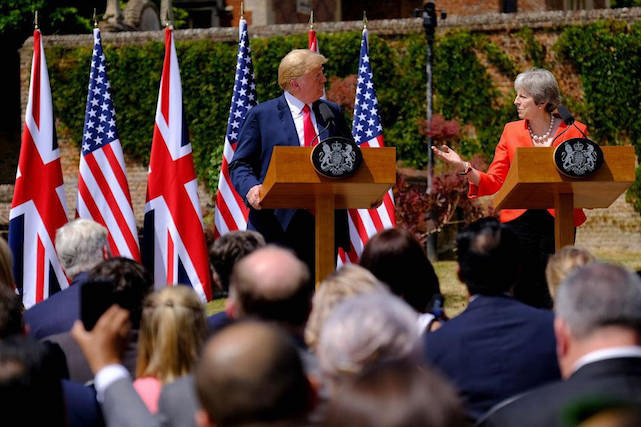So, in light of the government’s stated position on Brexit negotiations and the realities of international trade, which is more likely?
The white paper, which outlines the government’s vision for Brexit, suggests a complex set of arrangements regarding trade in goods. It proposes a common rulebook on goods and agricultural produce, including food. This commits the UK to maintaining the same product standards as the EU. It would keep EU dairy products in UK supermarkets and allow British water producers to keep selling their products in Europe.
The UK proposes to have a free trade agreement and customs arrangement with the EU that – while technically withdrawing from the single market – will in practice keep the UK in the EU’s single market for goods. This makes the UK’s desire to strike independent trade deals with the rest of the world start to look pretty tricky. This is largely because any trade deal for goods between the US and UK would have to tackle the issue of different standards in the US compared to the EU. Some of the more high-profile examples are genetically modified plants, as well as the use of beef hormones and antibiotics in animal feed.
According to the British government, the UK would ensure that if it were to import goods from the US that do not meet EU standards, these would stay in the UK and a cutting-edge customs mechanism would prevent these goods reaching the EU, all the while permitting frictionless trade and no border in Ireland. This is at best a very complex proposal. But it is potentially unworkable – how would one track all goods going from the UK to the EU in order to establish their origin and destination with a frictionless border?
There is no known existing technology that can achieve this – and developing such a system may be prohibitively expensive. The concepts of “demonstrating the destination” of products and being a “trusted trader”, which the UK government talks about, are not explained in any detail in the white paper.
When Trump first criticised the British government’s new Brexit plan he was most critical of the common rulebook idea because of the fact that it cedes power to the EU. He is already unhappy about his country’s trade relationship with the EU which he sees as unequal. And, as he pointed out in his Sun interview:
“If they do a deal like that, we would be dealing with the European Union instead of dealing with the UK, so it will probably kill the deal.”
Not worth the effort
It is not impossible for the UK and US to work around all the issues involved. But in reality it will probably seem like far too much effort for the US. Trade negotiations are never short and easy and require involvement of a large number of specialists. In the current atmosphere of engaging in trade wars with China and the EU, and renegotiating NAFTA, US trade negotiators already have a lot on their plate. The US would be better off reviving its attempt of to establish transatlantic trade deal with the EU, which is a much larger market than the UK.
But this all assumes that the EU accepts the UK’s proposal for free trade in goods – which is far from clear and, given its complexity, most unlikely. In reality, the UK is faced with a painful trade-off between moving to US standards and gaining better access to the US market, while losing some access to the EU markets or keeping EU standards and no deal with the US. There is a consensus that the first choice would make the UK poorer, while giving more control over future policies for politicians.
When it comes to trade in services, the British government’s proposals provide a lot more flexibility to strike a services deal with non-EU countries, including the US. But the cost would be that the UK would not continue to have the same access to the EU market – which makes up 40% of the UK’s total export of services. And, although the government’s plan leaves it more free to negotiate trade deals for services, these types of deals are much harder to negotiate and there are very few in existence. Given the UK’s huge surplus in services trade, there may be less enthusiasm from the likes of the US to sign a deal that would put them in the UK’s debt.
![]() So, despite backtracking on this, Trump’s initial comments to The Sun newspaper on the difficult prospect of a post-Brexit US-UK trade deal were more accurate. But this isn’t necessarily a bad thing for the UK, as the EU remains its biggest trade partner.
So, despite backtracking on this, Trump’s initial comments to The Sun newspaper on the difficult prospect of a post-Brexit US-UK trade deal were more accurate. But this isn’t necessarily a bad thing for the UK, as the EU remains its biggest trade partner.
